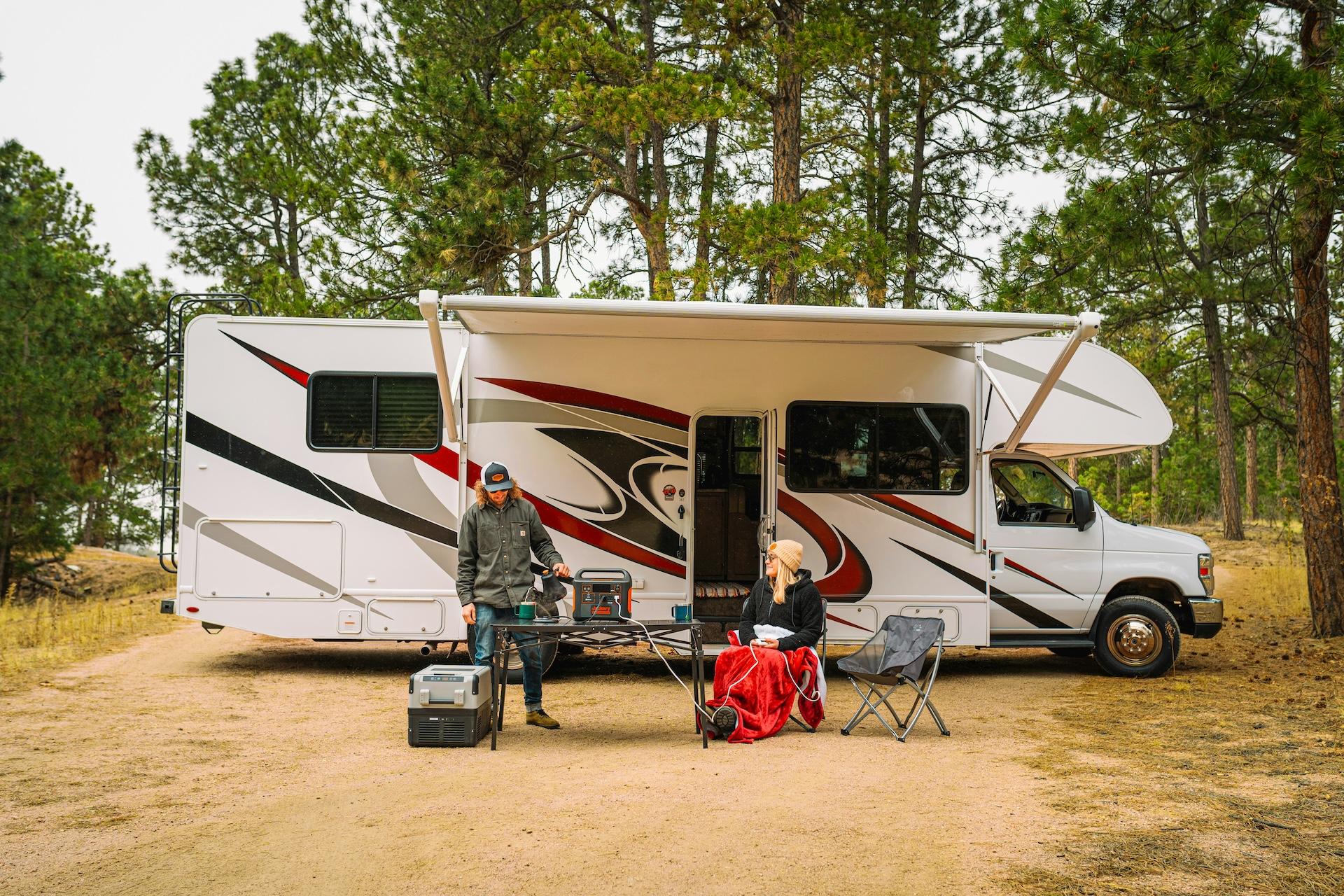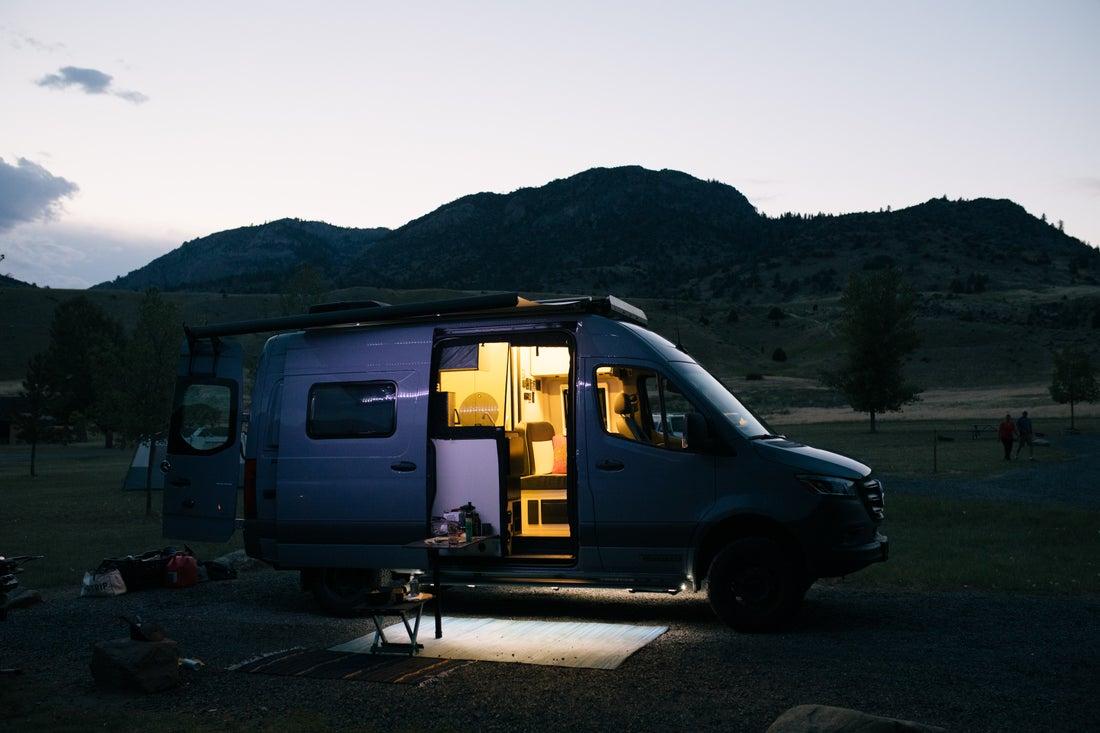Sep 22, 2021
The best RV batteries
The best RV batteries
Discover the best RV batteries for your needs with our expert guide. Learn about top battery types, features, and maintenance tips to keep your RV powered on all your adventures.
Common questions
Blog Post
Education

The best RV batteries for 2025 are lithium iron phosphate (LiFePO4) for longevity and performance, AGM batteries for balanced cost and reliability, and flooded lead-acid for budget-conscious buyers. Choose based on your usage patterns, budget, and power needs – lithium excels for boondocking and full-time RV living, while AGM offers great value for weekend warriors.
Let's cut through the confusion. After years on the road and countless conversations with RVers who've learned the hard way, here's what you actually need to know about RV batteries. Whether you're planning weekend getaways or full-time adventures, the right battery setup can make or break your off-grid experience.
What Types of RV Batteries Should I Consider?
Four main types dominate the RV market: flooded lead-acid (cheapest), AGM (best value), gel (extreme weather), and lithium iron phosphate (longest-lasting but priciest).
Understanding your options starts with knowing that RV batteries aren't car batteries. Your RV needs deep-cycle batteries designed to provide steady power over extended periods, not the quick bursts that start engines.
Flooded Lead-Acid Batteries
The old reliable. These use lead terminals suspended in liquid electrolyte and require regular maintenance – you'll need to check water levels and clean terminals. They're heavy, need to stay upright, and have the shortest lifespan among deep-cycle options. However, they're the most budget-friendly choice for occasional RV users.
Best for: Weekend campers on tight budgets who don't mind maintenance
Absorbed Glass Mat (AGM) Batteries
The sweet spot for most RVers. AGM batteries use fiberglass mats soaked in electrolyte, making them spill-proof and maintenance-free. They handle cold weather better than flooded batteries, can be mounted in any position, and offer better longevity than flooded options without the premium price of lithium.
Best for: Regular RV users wanting reliability without breaking the bank
Gel Batteries
The extreme weather specialists. Gel batteries use silica to create a gel-like electrolyte that performs better in very hot or cold conditions. They're sealed, maintenance-free, and can handle deeper discharges better than other lead-acid types. They cost more than AGM and charge slower, but excel in temperature extremes.
Best for: RVers traveling to extreme climates (desert Southwest, Alaska)
Lithium Iron Phosphate (LiFePO4) Batteries
The premium choice. Lithium batteries last significantly longer than lead-acid options, weigh roughly half as much, charge faster, and can be discharged deeper without damage. They also include built-in battery management systems for safety. The trade-off is substantially higher upfront cost.
Best for: Full-time RVers, serious boondockers, and those prioritizing weight savings
How Do I Choose the Right Battery Capacity?
Calculate your daily power consumption, then size your battery bank to provide multiple days of backup power while accounting for each battery type's discharge limitations.
Most RVers underestimate their power needs until they're sitting in the dark. Here's the approach that works:
Step 1: Inventory your power-consuming devices
- LED lights (varies by number and type)
- Water pump (intermittent high draw)
- Furnace fan (significant power user)
- Refrigerator (constant moderate draw)
- Phone/device charging
- Entertainment systems
Step 2: Estimate realistic daily usage patterns for each device
Step 3: Account for battery discharge limitations
- Lead-acid batteries: Should not be discharged below 50% for longevity
- Lithium batteries: Can safely discharge to 20% or lower
Step 4: Plan for multiple days without charging (solar, generator, or shore power)
What Are Proven RV Battery Brands Worth Considering?
Battle Born leads the lithium market, established AGM manufacturers like Lifeline offer proven reliability, while Trojan dominates flooded battery applications with decades of RV industry experience.
Rather than recommending specific models with pricing that changes frequently, here are manufacturers with strong reputations in the RV community:
Lithium Options
Battle Born has built a strong reputation in the RV lithium space with comprehensive warranty coverage and systems designed specifically for RV applications.
Other notable lithium manufacturers serving the RV market include Dakota Lithium, Renogy, and AIMS Power, each with different feature sets and price points.
AGM Battery Leaders
Lifeline batteries are widely respected among serious RVers for durability and deep-cycle performance.
Universal Power Group offers more budget-friendly AGM options that perform well for casual users.
Optima provides dual-purpose batteries that can serve both starting and deep-cycle needs.
Flooded Battery Standards
Trojan has been the go-to choice for flooded deep-cycle batteries in RV applications for decades, offering both 6V and 12V configurations.
How Should I Install and Maintain RV Batteries?
Install batteries in ventilated compartments with proper tie-downs, use marine-grade cables, and maintain appropriate charge levels – specifics vary significantly by battery chemistry.
Proper installation and maintenance practices can dramatically extend battery life regardless of type chosen:
Universal Installation Requirements
- Secure batteries with appropriate tie-downs (safety critical for heavy lead-acid types)
- Use marine-grade cables and connections rated for the current
- Install in ventilated areas (especially important for flooded batteries)
- Consider battery monitoring systems for accurate state-of-charge readings
Maintenance by Battery Type
Flooded Batteries: Require regular water level checks, terminal cleaning, and periodic equalization charging. Must be stored fully charged in freezing conditions.
AGM/Gel Batteries: Maintenance-free operation but benefit from proper charging profiles and avoiding deep discharge cycles.
Lithium Batteries: Minimal maintenance required thanks to built-in battery management systems, but have specific temperature requirements for charging.

Should I Upgrade My RV's Charging System?
Most RVs need charging system upgrades when switching to lithium batteries, while AGM and flooded batteries often work with existing systems if properly configured.
Your RV's factory charging system was likely designed for basic flooded batteries. Upgrade considerations:
Definitely Consider Upgrades For:
- Any lithium battery installation (requires compatible charging profiles)
- Large battery banks regardless of type
- Serious boondocking applications
- Cold weather camping
Evaluate Current System For:
- AGM battery installations (may benefit from smart chargers)
- Frequent deep cycling applications
- Systems showing signs of undercharging
Likely Fine As-Is:
- Weekend camping with regular hookup access
- Smaller battery banks with light usage
- Occasional boondocking
Ready to upgrade your RV's power system? Get the right insurance coverage for your investment. Get Your RV Quote Now and hit the road with confidence, knowing your rig and your power system are both protected.
Roamly: Insurance built for wherever the road takes you.
Match your battery choice to your actual usage patterns. Weekend campers have different needs than full-timers, and occasional boondockers need different setups than those living off-grid.
Never mix different battery chemistries in the same bank. Different types charge and discharge at different rates, which can damage batteries and create safety hazards.
Storage requirements vary by battery type. Lead-acid batteries stored in freezing conditions should be removed and stored fully charged in warmer locations. Lithium batteries can often remain installed but have specific temperature requirements for charging.
Key signs include inability to hold charge overnight, visible corrosion or swelling, and significantly reduced capacity compared to when new. Battery monitors help track performance degradation over time.
Battery monitors provide much more accurate information than voltage readings alone. They track actual amp-hours consumed and remaining capacity, which is essential for managing power consumption while boondocking.
Roamly Insurance Group, LLC ("Roamly") is a licensed general agent for affiliated and non-affiliated insurance companies. Roamly is licensed as an agency in all states in which products are offered. Roamly license numbers. Availability and qualification for coverage, terms, rates, and discounts may vary by jurisdiction. We do not in any way imply that the materials on the site or products are available in jurisdictions in which we are not licensed to do business or that we are soliciting business in any such jurisdiction. Coverage under your insurance policy is subject to the terms and conditions of that policy and is ultimately the decision of the buyer.
Policies provided by Roamly are underwritten by Spinnaker Insurance Company, Progressive Insurance Company, Safeco Insurance Company, Foremost Insurance Company, National General Insurance, Mobilitas Insurance Company, and others.
Connect
© 2026 Roamly All rights reserved.
